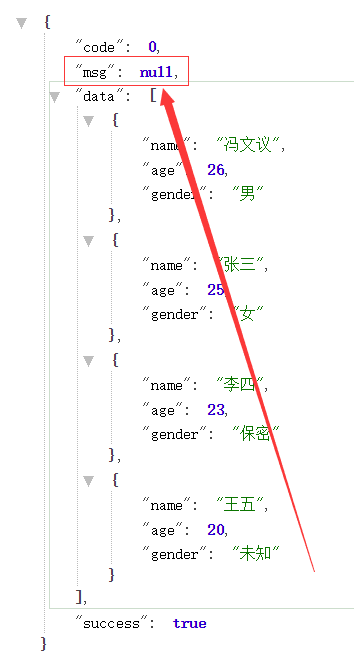Introduction
JavaLib has implemented the Result module for a long time, and I've been using it, but that's for the public API interface. If the back-end developers write the API interface to the front-end like that, it's very troublesome, so they decided to rewrite it early. I also refer to a lot of people. Looking at the Spring Builder mode, it's a bit confusing, and setting calculation is a failure.
outline
Let's see what it looks like.
public class App { public static void main(String[] args) { // Success, no data, custom return code and description Result result1 = ResultResponseUtil.ok().code(0).msg("Success"); // Success, return data, custom return code and description Result result2 = ResultResponseUtil.ok().code(0).msg("Success").data("data"); // Success, no data, store return code in enum mode Result result3 = ResultResponseUtil.ok().status(DefaultReturnCode.SUCCESS); // Success, return data, store return code in enum mode Result result4 = ResultResponseUtil.ok().status(DefaultReturnCode.SUCCESS).data("data"); // Failed, no data, custom return code and description Result result5 = ResultResponseUtil.error().code(-1).msg("Error"); // Failure, return data, custom return code and description Result result6 = ResultResponseUtil.error().code(-1).msg("Error").data("data"); // Failed, no data, store return code in enum mode Result result7 = ResultResponseUtil.error().status(DefaultReturnCode.ERROR_INIT); // Failed, return data, store return code in enum mode Result result8 = ResultResponseUtil.error().status(DefaultReturnCode.ERROR_INIT).data("data"); Console.info(result1); Console.info(result2); Console.info(result3); Console.info(result4); Console.info(result5); Console.info(result6); Console.info(result7); Console.info(result8); Console.info(); Console.info(new Gson().toJson(result1)); Console.info(new Gson().toJson(result2)); Console.info(new Gson().toJson(result3)); Console.info(new Gson().toJson(result4)); Console.info(new Gson().toJson(result5)); Console.info(new Gson().toJson(result6)); Console.info(new Gson().toJson(result7)); Console.info(new Gson().toJson(result8)); } }
Print results:
DefaultResult{code=0 success=true msg=Success data=null} DefaultResult{code=0 success=true msg=Success data=data} DefaultResult{code=0 success=true msg=Success data=null} DefaultResult{code=0 success=true msg=Success data=data} DefaultResult{code=-1 success=false msg=Error data=null} DefaultResult{code=-1 success=false msg=Error data=data} DefaultResult{code=-1 success=false msg=init... data=null} DefaultResult{code=-1 success=false msg=init... data=data} {"success":true,"code":0,"msg":"Success"} {"success":true,"code":0,"msg":"Success","data":"data"} {"success":true,"code":0,"msg":"Success"} {"success":true,"code":0,"msg":"Success","data":"data"} {"success":false,"code":-1,"msg":"Error"} {"success":false,"code":-1,"msg":"Error","data":"data"} {"success":false,"code":-1,"msg":"init..."} {"success":false,"code":-1,"msg":"init...","data":"data"}
Use
import com.fengwenyi.javalib.result.DefaultReturnCode; import com.fengwenyi.javalib.result.Result; import com.fengwenyi.javalib.result.ResultResponseUtil; import lombok.Data; import lombok.experimental.Accessors; import org.springframework.boot.SpringApplication; import org.springframework.boot.autoconfigure.SpringBootApplication; import org.springframework.web.bind.annotation.GetMapping; import org.springframework.web.bind.annotation.RestController; @SpringBootApplication @RestController public class ApiResultApplication { public static void main(String[] args) { SpringApplication.run(ApiResultApplication.class, args); } /** * Get all user data * @return (json) */ @GetMapping("/getUsers") public Result getUsers() { User user1 = new User().setName("Feng Wen Yi").setAge(26).setGender("male"); User user2 = new User().setName("Zhang San").setAge(25).setGender("female"); User user3 = new User().setName("Li Si").setAge(23).setGender("secrecy"); User user4 = new User().setName("Wang Wu").setAge(20).setGender("Unknown"); User [] users = {user1, user2, user3, user4}; return ResultResponseUtil.ok().status(DefaultReturnCode.SUCCESS).data(users); } } @Data @Accessors(chain = true) class User { // Full name private String name; // Age private Integer age; // Gender private String gender; }
Results (formatted):
{ "code":0, "msg":"Success", "data":[ { "name":"Feng Wen Yi", "age":26, "gender":"male" }, { "name":"Zhang San", "age":25, "gender":"female" }, { "name":"Li Si", "age":23, "gender":"secrecy" }, { "name":"Wang Wu", "age":20, "gender":"Unknown" } ], "success":true }
There is a problem in this way, which is also found in the previous version. Let's modify the following code:
//return ResultResponseUtil.ok().status(DefaultReturnCode.SUCCESS).data(users); return ResultResponseUtil.ok().code(0).data(users);
See the result:

API return value is null. I'm sure you have encountered this problem. How can we avoid this problem? There are many solutions on the Internet. What I want to say is that we should write according to the rules and write completely.
Let's look at another approach:
@GetMapping("/getUsers2") public String getUsers2() { User user1 = new User().setName("Feng Wen Yi").setAge(26).setGender("male"); User user2 = new User().setName("Zhang San").setAge(25).setGender("female"); User user3 = new User().setName("Li Si").setAge(23).setGender("secrecy"); User user4 = new User().setName("Wang Wu").setAge(20).setGender("Unknown"); User [] users = {user1, user2, user3, user4}; Result result = ResultResponseUtil .ok() .status(DefaultReturnCode.SUCCESS) .data(users); return new Gson().toJson(result); }
When writing public interfaces, we must pay attention to avoid all unnecessary.
data
[1] JavaLib
[2] JavaLib Result module test code